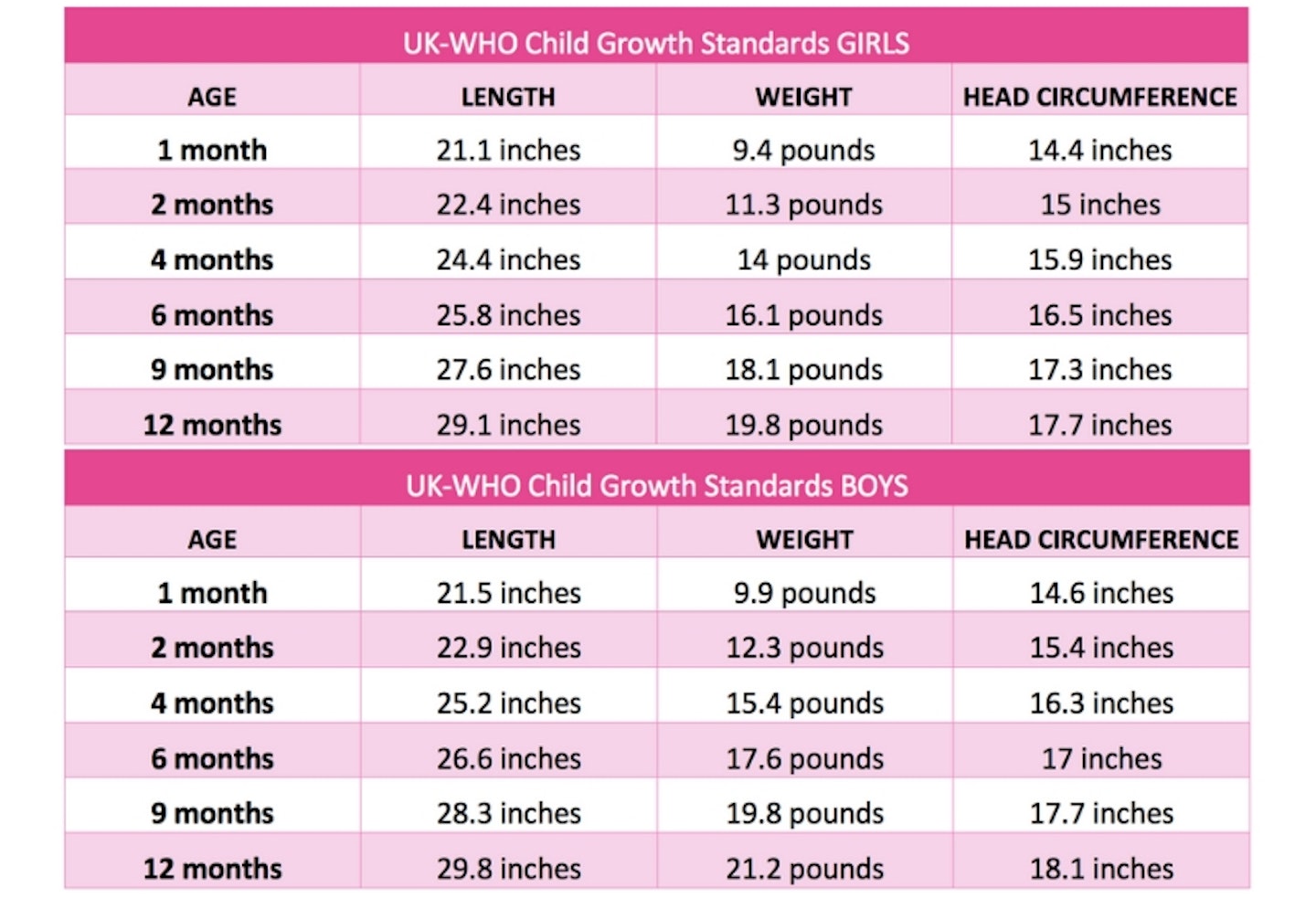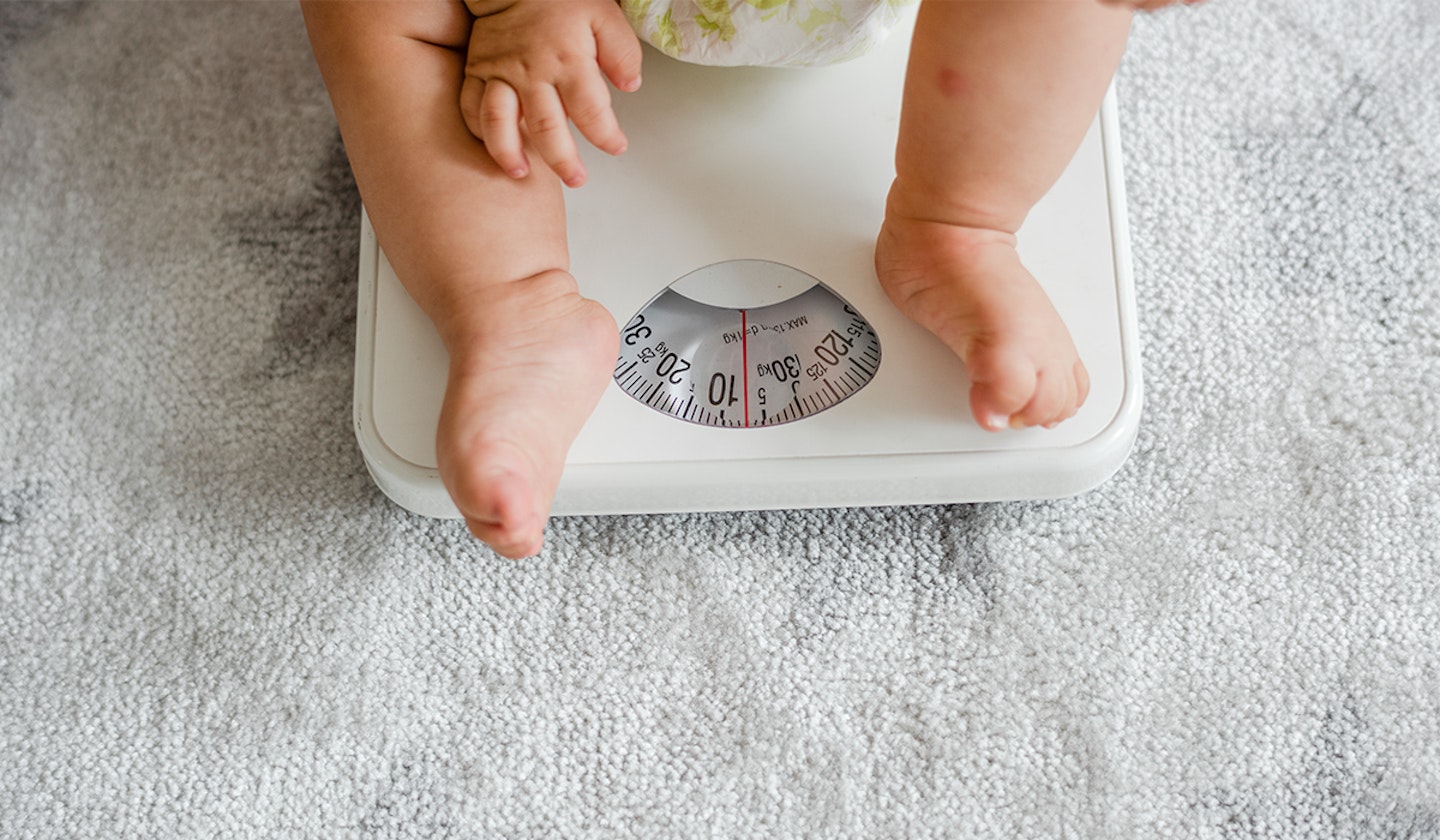
Medically Reviewed by: Charlie Blyth
Your tot can experience baby growth spurts where they grow almost a centimetre bigger overnight. From sudden changes in eating and sleeping habits as well as behaviour changes, these growth spurts can bring a lot of disruption to your daily routine.
Your youngster can grow as much as nine millimetres in length in just 24 hours. "Babies go to sleep, and they wake up longer!" explains expert in human growth and development, Dr Michelle Lampl. While the line you carefully plot on the centile growth charts in your youngster’s red book might make it look like they're putting on weight consistently, growth actually happens in fits and starts, with rapid increases in length or height and weight.
What are baby growth spurts?
Your baby grows most rapidly in their first year, and they're likely to double their birth weight between four and six months and triple it by the time they are one. By their first birthday, they're likely to be about one and a half times as long as they were when they were born – and that’s a lot of growth spurts! As they get older, the frequency of growth spurts slows down to a few months, or longer, apart.
But between the age of one and two, they're still likely to gain around five pounds and grow around six centimetres. And between the age of two and three, they're likely to gain five to six pounds and grow a further five to eight centimetres.
And with such a significant change happening, it’s no wonder that your youngster is likely to be a little out of sorts during a growth spurt. "The associated behavioural changes only last a couple of days, but they are a clear signal that they're about to have, or are currently having, a growth spurt," says Michelle.
"So if your child is behaving out of character – one day they are perfectly happy and the next they're suddenly grumpy – step back and consider whether all the signs are pointing to them having a growth spurt," suggests Michelle. And no matter what their age, the signs will be the same.
When do babies have growth spurts?
Babies are constantly growing and developing and growth spurts can happen at any time and of course, every baby is different.
According to Charlie Blyth, founder of The Healthy Child Co. and a dedicated specialist public health nurse (health visitor), "Growth spurts are short but intense, usually lasting anywhere from a few days to a week."
Charlie suggest growth spurts will occur around:
As each child's growth patterns vary, do not worry if you do not notice your baby having growth spurts at these stages. Boys tend to be a little heavier and taller, and their growth pattern is slightly different to girls. Some children may have more or fewer spurts than the suggested points.
Charlie adds, “Some babies have more frequent spurts, while others grow more steadily. While growth spurts can be exhausting, they don’t last forever, and once they pass, you might notice new skills emerging, like increased babbling, improved head control or even early attempts at rolling.
The best way to support your baby through these phases is to follow their cues, offer extra feeds, and provide plenty of comfort, before you know it, they’ll be on to their next big milestone!”
According to Charlie, unless you are worried about your baby, have concerns about feeding, or have been advised by a health professional, it is not necessary for you to weigh your baby regularly or worry about their growth.
Your midwife or health visitor will come and weigh your baby and asses their growth alongside the baby weight chart in their little red book. The NHS recommends "After the first two weeks, your baby should be weighed:
• No more than once a month up to six months of age
• No more than once every two months from 6-12 months of age
• No more than once every three months over the age of one".
Charlie says, "Some parents can hold on these time frames rigidly and then don’t access support when they need it. The growth chart recommendations also advise babies should be weighed at 8, 12, and 16 weeks alongside their immunisations. A health visitor or GP should complete the 8 week weight and the other two we advise parents to access their local healthy baby clinic. Which fits in with the 'no more than once a month'"
Your baby's weight and progression will be checked by health professionals throughout their early years. The Royal College of Paediatrics and Child Health and UK-WHO release growth charts that you can use as a rough guideline.
Baby growth charts

Chart data pulled from Boys 0-4 years growth chart.pdf and Girls 0-4 years growth chart.pdf
Charlie explains, "The figures presented in this table are based on the 50th centile only and are intended for general reference purposes. Individual variations are expected."
Are baby growth spurts painful?
There is no evidence to suggest baby growth spurts cause your little one any pain. Sometimes your baby might seem unsettled or more grumpy than usual but this is completely normal. Growth spurts can make your baby seem out of sorts or irritable but they do not cause fever, extreme irritability or listlessness. If your baby does exhibit more extreme symptoms or they seem to continue for more than a few days to a week then it is a good idea to get the baby checked at the doctor or by a health visitor.
Other explanations for increased appetite, sleep changes, and bad moods can be minor illnesses, baby is teething or changes to their routine.
Baby growth spurt signs
Weight gain
This one is pretty obvious as if your baby is growing, they will be increasing in weight. Their weight is likely to be more noticeable than the actual growth changes as they may just start to feel a little heavier when you pick them up or hold them. You don't need to worry about weighing them too often, once every couple of months is perfect for a baby over six months but some parents do prefer to invest in some baby weighing scales for monitoring their weight on a more regular basis.
Charlie says "Their clothes may start feeling snug overnight, as growth spurts often lead to sudden weight gain or lengthening."
Sleeping more
You may notice your baby is more tired and sleeps more frequently or for longer during a growth spurt. All this growing is tiring work and when your baby sleeps they produce more of the protein human growth hormone (HGH).
Sleeping less
"Disrupted sleep is another big clue; they might wake more frequently at night or take shorter naps as their body works hard to grow," Charlie says.
Yep, they might sleep more or they might sleep less! It depends on the individual baby but they may be more likely to wake at night or nap less during the day. It is difficult to maintain a routine during your baby's early life when they are going through several developmental changes so don't worry too much!
Clinginess
You might find your baby is a bit more clingy than usual. The best thing to do is to cuddle them and soothe them until they feel more comfortable on their own. Often during growth spurts, the baby goes through development and it can be the start of new skills like crawling or walking.
"You may also notice extra fussiness or clinginess, some babies become unsettled and want more cuddles or comfort during a growth spurt.," Charlie explains.
Appetite increase
The most commonly noticed symptom of a growth spurt is your baby feeding more. If you are breastfeeding, feed the baby whenever they are hungry, even if it seems like a lot more. If you are using formula, just add in an extra bottle. This increase in appetite usually only lasts throughout the period of the growth spurt.
"One of the most common signs is increased appetite, whether breastfed or bottle-fed, babies often demand more feed and may seem unsatisfied with their usual amount. This doesn’t mean they need to start solid foods earlier than recommended, just that they need more feed," Charlie says.
Changes in feeding routine
Sleep routines are not the only thing affected by a growth spurt. Increases in appetite might mean your baby wants to feed at different times. Try and rest when your baby rests and don't be too preoccupied with maintaining a routine as it is just important your baby is supported throughout the growth spurt.
Bad mood
You may find your baby is a bit more grouchy and cries more often. A general bad mood is common during a growth spurt and they may find it harder to settle during the day or at night. As with all of these growth spurt signs, they are likely to calm down after a few days.
Charlie advises, "These phases usually last a few days, and while they can be exhausting, they’re a sign that your baby is developing just as they should. Offering extra feeds, responding to their need for comfort, and following their cues can help make these rapid changes smoother for both of you!"
Things you can do during a baby growth spurt

1) Relax the routine
Your youngster’s sleep is likely to be disrupted in the days before their growth spurt so they may sleep for longer at some point. If they have an extended baby nap time, let them snooze. And, if you can, take this time to catch up on your missed sleep, too. Wait until they've finished the spurt before you get their sleep routine back on track.
2) Be led by their appetite
Your child is likely to want to eat lots more during a growth spurt. Let their appetite lead you during this period, and practise on-demand feeding, so they eat or drink whenever they're hungry. They'll naturally go back to their normal appetite – and normal feeding routine – within a couple of days.
"During a growth spurt, babies can become fussier than usual due to increased hunger, discomfort, or the need for extra comfort. One of the first things to try is offering extra feedings, as growth spurts often bring a boost in hunger," Charlie suggests.
3) Fuel up
If you’re breastfeeding your baby, you’ll need to eat more to cope with the extra demand of your baby’s increased feeding. Snack regularly with nutritional mini-meals of crackers and cream cheese, or a tub of mixed seeds and nuts, rather than waiting until you’re ravenous and reaching for the biscuits. Drink lots of water to avoid dehydration, too.
4) Up their bottles
If you’re bottle-feeding your baby, give your baby a second bottle rather than switching to a hungry baby formula, which could upset their tummy if they're not used to it. You can return to their normal amount once the spurt is over.
5) Rope in family and friends
Your baby is likely to want to feed around the clock during a growth spurt, and may also be pretty cranky and not want to be put down. And that’s hard work for you, mama! Ask family and friends to help with anything and everything from getting the shopping to simply making you a cup of tea.
6) Buy a carrier
If you haven’t already invested in a baby sling or carrier, get one now! Being close to you will comfort your baby, and you’ll still be able to get everything you need to do. And if they're struggling to settle, then the cosy, rhythmical feeling of going for a stroll in a carrier can work like magic.
"Babies may seek more physical closeness, so skin to skin, holding them or using a baby carrier can provide the comfort they crave. Creating a soothing environment by keeping the room calm, using soft music or white noise can also help calm a fussy baby," Charlie advises.

7) Restore yourself
Growth spurts can be emotionally exhausting for you, too. Build in some moments of much-needed time out, even if it’s just going for a walk around the block while your partner looks after your baby. You’ll be better able to help them deal with their emotions if you’re feeling calm yourself.
8) Soothe growing pains
When your baby or toddler is having a growth spurt, a soothing baby massage will help calm them as well as ease growing pains. Add a two-minute massage to every day-time nappy change, and a longer post-bath rub if they're happy.
9) Don’t stress about night feeds
Your baby is likely to wake up and need night feeds during a growth spurt, even if they're previously been sleeping through for a while. And they will go back to sleeping through, don’t worry. Once they've finished growing, but they carry on waking from habit, try giving them a drink of water instead of milk. Charlie cautions, "Giving water instead of milk is only recommended for over one year olds as smaller babies still need night nutrition."
"Lastly, offering empathy, patience and reassurance is key; sometimes simply being present and comforting can make all the difference. While growth spurts can be challenging, they are temporary, and your baby will soon return to their usual self," Charlie concludes.
About the experts
Charlie Blyth has also provided her expert advice and medically reviewed this article. Charlie is the founder of The Healthy Child Co and a dedicated specialist public health nurse (Health Visitor) with over 13 years of experience in the NHS, including 9 years as a health visitor, where she supported hundreds of families in the community. With a deep commitment to child health and development, Charlie is passionate about challenging outdated parenting methods and advocating for evidence-based practices to promote responsive parenting and positive child growth.
Physician-scientist, academic, and author Dr. Michelle Lampl has dedicated her career to learning more about how babies grow. She specialises in the overall study of human growth and development extending to the different influences on our growth from birth and her landmark research established that us humans grow intermittently, not continuously.
About the author
Stephanie Spencer is the Deputy Digital Editor at Mother&Baby and auntie to four aged 7 to 2 months old. With a particular interest in health, she loves discovering products that make parent’s lives easier.
